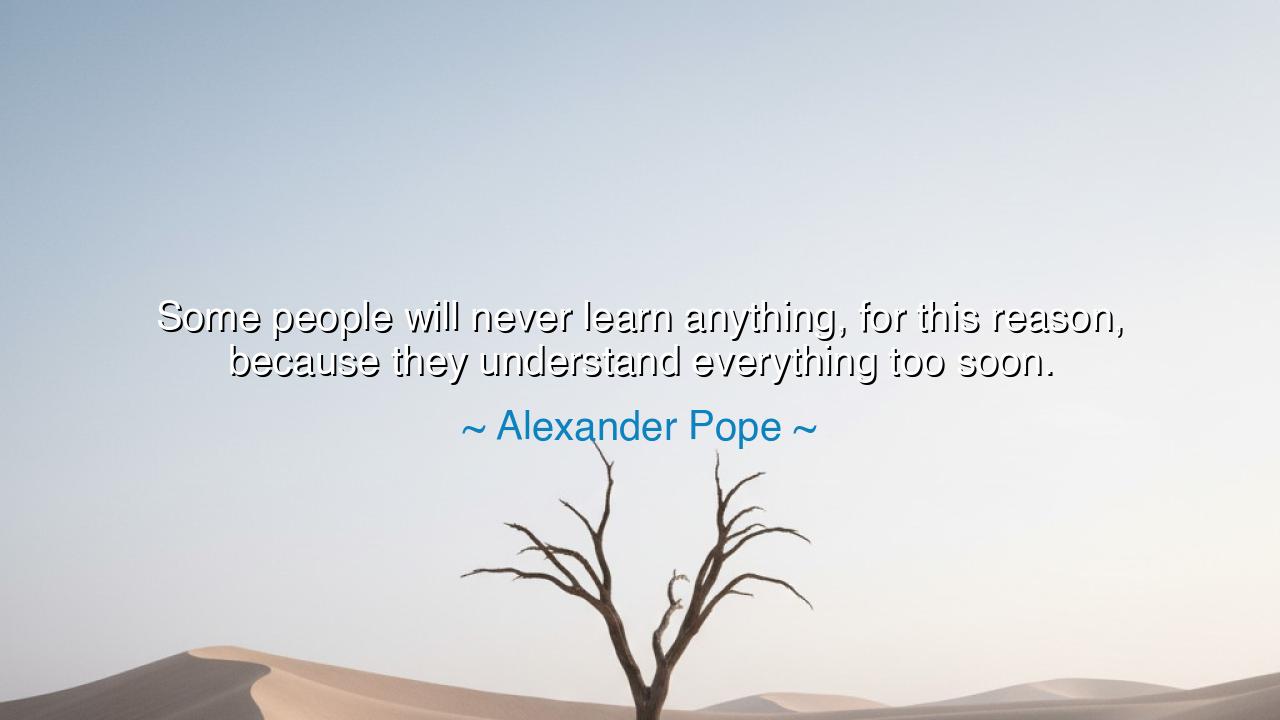
Some people will never learn anything, for this reason, because
Some people will never learn anything, for this reason, because they understand everything too soon.






Alexander Pope, poet of sharp insight and master of human nature, once declared: “Some people will never learn anything, for this reason, because they understand everything too soon.” In this paradox lies a profound truth about arrogance and the closing of the mind. For the one who believes they already understand everything no longer seeks to learn, no longer listens, no longer questions. Their certainty becomes a prison, and though they may appear clever, they are in truth the poorest of students, for their growth has ceased.
The ancients knew this danger well. Socrates, though hailed as wise, proclaimed only that he knew nothing. His greatness lay in his endless questioning, in his refusal to claim mastery too soon. By contrast, the sophists of his age pretended to knowledge and sold their cleverness as truth. Yet history remembers Socrates as the father of philosophy, while the sophists are remembered as shallow tricksters. Pope’s words remind us that humility in learning is the gateway to wisdom, while false certainty is the death of it.
Consider the tale of Galileo. In his time, many scholars dismissed his discoveries because they already believed they understood the heavens. The geocentric model had been accepted for centuries; to question it was heresy. Their pride prevented them from learning what the stars themselves revealed. Galileo, by contrast, approached the heavens with wonder and inquiry. His willingness to doubt what others believed they understood led to a revolution in science. The proud “knowers” remained ignorant, while the humble seeker discovered truth.
The meaning of Pope’s words extends beyond philosophy or science—it touches every realm of life. How often do quarrels endure because each person insists they already know the other’s mind? How often do leaders fail because they refuse to listen, believing they already understand what their people need? The heart that shuts itself too soon, convinced it has all the answers, will never truly grow. It is like a vessel filled too quickly with water: no new drop can enter, and the water soon becomes stagnant.
There is also within Pope’s observation a warning about impatience. Some people grasp at easy explanations and call them complete. They prefer speed over depth, answers over questions. Yet the deepest truths cannot be seized so hastily; they require patience, reflection, and the endurance to dwell in uncertainty. To claim understanding too soon is to mistake the shadow for the substance, the surface for the depth. It is to stop digging just before striking the wellspring of wisdom.
The lesson is clear: guard yourself against the arrogance of quick certainty. Approach knowledge with humility, as a pilgrim approaches a holy temple—step by step, with reverence. Be willing to admit what you do not know. Question even what seems obvious. Welcome correction, for it is the chisel that shapes the stone of your mind. In this way, you will never cease to learn, and your understanding will be deep, not shallow.
Practical action follows easily. When you read, pause to reflect rather than rushing to judgment. When you listen, do so not only to reply, but to truly hear. When you feel certain, test your certainty by asking: Have I considered all sides? Could there be more? Cultivate humility as a discipline, and curiosity as a lifelong companion. For the wise are not those who know everything, but those who remain open to learn from everything.
So let this wisdom be passed down: some will never learn, because they think they already know. Do not be among them. Keep your mind like fertile soil, open to receive new seeds. For the moment you declare yourself finished with learning, you begin to wither. But the one who remains teachable, even in old age, remains forever young—forever walking the path of wisdom.






AAdministratorAdministrator
Welcome, honored guests. Please leave a comment, we will respond soon